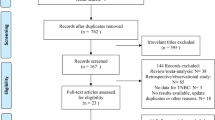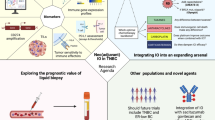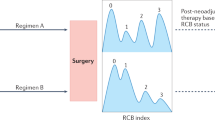Abstract
Background
Neoadjuvant immunotherapy (nIO) has emerged as a treatment option for stage II–III triple-negative breast cancer (TNBC). While randomised clinical trials (RCTs) demonstrated pathological complete response rate benefit to nIO added to chemotherapy, additional data on long-term outcomes is warranted. We performed this analysis to evaluate long-term efficacy outcomes of nIO in TNBC.
Methods
We searched databases for RCTs evaluating nIO in early-stage TNBC. A meta-analysis of extracted individual patient data (EIPD) was performed to evaluate EFS and OS, with data from reported Kaplan–Meier plots. Additionally, we conducted a trial-level meta-analysis using fixed and random effects models.
Results
The literature search resulted in four included RCTs with available EFS or OS (KEYNOTE-522, IMpassion031, I-SPY2 and GeparNuevo). EIPD showed that the addition of nIO to chemotherapy provides statistically significant benefits in EFS (HR 0.62, 0.50–0.76; p < 0.001) and OS (HR 0.62, 0.46–0.82, p < 0.001). Number needed to treat to avoid one EFS or OS event in 4 years was 9 and 14, respectively. Trial-level meta-analysis yielded similar results (EFS: HR 0.64, 0.51–0.79; OS: 0.57, 0.37–0.89).
Conclusions
Results show that nIO combined with chemotherapy can provide significant EFS and OS benefits, supporting its use as standard treatment for early-stage TNBC.
This is a preview of subscription content, access via your institution
Access options
Subscribe to this journal
Receive 24 print issues and online access
$259.00 per year
only $10.79 per issue
Buy this article
- Purchase on Springer Link
- Instant access to full article PDF
Prices may be subject to local taxes which are calculated during checkout



Similar content being viewed by others
Data availability
The datasets generated during and/or analysed during the current study are available from the corresponding author on reasonable request.
Code availability
The complete code for this manuscript is available upon reasonable request to the corresponding author.
References
Dent R, Trudeau M, Pritchard KI, Hanna WM, Kahn HK, Sawka CA, et al. Triple-negative breast cancer: clinical features and patterns of recurrence. Clin Cancer Res. 2007;13:4429–34.
Liedtke C, Rody A, Gluz O, Baumann K, Beyer D, Kohls E-B, et al. The prognostic impact of age in different molecular subtypes of breast cancer. Breast Cancer Res. Treat. 2015;152:667–73.
von Minckwitz G, Untch M, Blohmer JU, Costa SD, Eidtmann H, Fasching PA, et al. Definition and impact of pathologic complete response on prognosis after neoadjuvant chemotherapy in various intrinsic breast cancer subtypes. J Clin Oncol. 2012;30:1796–804.
Cortazar P, Zhang L, Untch M, Mehta K, Costantino JP, Wolmark N, et al. Pathological complete response and long-term clinical benefit in breast cancer: the CTNeoBC pooled analysis. Lancet. 2014;384:164–72.
Mittendorf EA, Zhang H, Barrios CH, Saji S, Jung KH, Hegg R, et al. Neoadjuvant atezolizumab in combination with sequential nab-paclitaxel and anthracycline-based chemotherapy versus placebo and chemotherapy in patients with early-stage triple-negative breast cancer (IMpassion031): a randomised, double-blind, phase 3 trial. Lancet. 2020;396:1090–100.
Nanda R, Liu MC, Yau C, Shatsky R, Pusztai L, Wallace A, et al. Effect of pembrolizumab plus neoadjuvant chemotherapy on pathologic complete response in women with early-stage breast cancer: an analysis of the ongoing phase 2 adaptively randomized I-SPY2 trial. JAMA Oncol. 2020;6:676–84.
Schmid P, Cortes J, Pusztai L, McArthur H, Kümmel S, Bergh J, et al. Pembrolizumab for early triple-negative breast cancer. N Engl J Med. 2020;382:810–21.
Barrios C, Harbeck N, Zhang HA, Saji S, Jung KH, Hegg R, et al. IMpassion031 trial evaluating neoadjuvant atezolizumab (atezo) plus chemotherapy (CT) followed by open-label adjuvant atezo in patients (pts) with early-stage triple-negative breast cancer (eTNBC). Ann Oncol. 2023;8:101220.
Schmid P, Cortes J, Dent R, Pusztai L, McArthur H, Kümmel S, et al. Event-free survival with pembrolizumab in early triple-negative breast cancer. N Engl J Med. 2022;386:556–67.
Loibl S, Schneeweiss A, Huober JB, Braun M, Rey J, Blohmer JU, et al. Durvalumab improves long-term outcome in TNBC: results from the phase II randomized GeparNUEVO study investigating neodjuvant durvalumab in addition to an anthracycline/taxane based neoadjuvant chemotherapy in early triple-negative breast cancer (TNBC). J Clin Oncol. 2021;39:506.
Stewart LA, Clarke M, Rovers M, Riley RD, Simmonds M, Stewart G, et al. Preferred reporting items for systematic review and meta-analyses of individual participant data: the PRISMA-IPD statement. JAMA. 2015;313:1657–65.
Guyot P, Ades AE, Ouwens MJNM, Welton NJ. Enhanced secondary analysis of survival data: reconstructing the data from published Kaplan-Meier survival curves. BMC Med Res Methodol. 2012;12:9.
Liu N, Zhou Y, Lee JJ. IPDfromKM: reconstruct individual patient data from published Kaplan-Meier survival curves. BMC Med Res Methodol. 2021;21:111.
Gilboa S, Pras Y, Mataraso A, Bomze D, Markel G, Meirson T. Informative censoring of surrogate end-point data in phase 3 oncology trials. Eur J Cancer. 2021;153:190–202.
Pak K, Uno H, Kim DH, Tian L, Kane RC, Takeuchi M, et al. Interpretability of cancer clinical trial results using restricted mean survival time as an alternative to the hazard ratio. JAMA Oncol. 2017;3:1692–6.
Royston P, Parmar MKB. The use of restricted mean survival time to estimate the treatment effect in randomized clinical trials when the proportional hazards assumption is in doubt. Stat Med. 2011;30:2409–21.
Royston P, Parmar MKB. Restricted mean survival time: an alternative to the hazard ratio for the design and analysis of randomized trials with a time-to-event outcome. BMC Med Res Methodol. 2013;13:152.
Park SH, Han K, Park SY. Mistakes to avoid for accurate and transparent reporting of survival analysis in imaging research. Korean J Radio. 2021;22:1587–93.
Bewick V, Cheek L, Ball J. Statistics review 12: survival analysis. Crit Care. 2004;8:389–94.
Dehbi H-M, Royston P, Hackshaw A. Life expectancy difference and life expectancy ratio: two measures of treatment effects in randomised trials with non-proportional hazards. BMJ. 2017;357:j2250.
Rizzo A, Cusmai A, Massafra R, Bove S, Comes MC, Fanizzi A, et al. Pathological complete response to neoadjuvant chemoimmunotherapy for early triple-negative breast cancer: an updated meta-analysis. Cells. 2022;11:1857.
Geyer CE, Sikov WM, Huober J, Rugo HS, Wolmark N, O’Shaughnessy J, et al. Long-term efficacy and safety of addition of carboplatin with or without veliparib to standard neoadjuvant chemotherapy in triple-negative breast cancer: 4-year follow-up data from BrighTNess, a randomized phase III trial. Ann Oncol. 2022;33:384–94.
Poggio F, Bruzzone M, Ceppi M, Pondé NF, La Valle G, Del Mastro L, et al. Platinum-based neoadjuvant chemotherapy in triple-negative breast cancer: a systematic review and meta-analysis. Ann Oncol. 2018;29:1497–508.
Poggio F, Tagliamento M, Ceppi M, Bruzzone M, Conte B, Fregatti P, et al. Adding a platinum agent to neoadjuvant chemotherapy for triple-negative breast cancer: the end of the debate. Ann Oncol. 2022;33:347–9.
Gupta S, Nair NS, Hawaldar R, Vanmali V, Parmar V, Gulia S. Abstract GS5-01: addition of platinum to sequential taxane-anthracycline neoadjuvant chemotherapy in patients with triple-negative breast cancer: a phase III randomized controlled trial. Cancer Res. 2023;83:S5–6.
Bar N, Costa F, Das R, Duffy A, Samur M, McCachren S, et al. Differential effects of PD-L1 versus PD-1 blockade on myeloid inflammation in human cancer. JCI Insight. 2020;5:e129353.
Tartarone A, Roviello G, Lerose R, Roudi R, Aieta M, Zoppoli P. Anti-PD-1 versus anti-PD-L1 therapy in patients with pretreated advanced non-small-cell lung cancer: a meta-analysis. Future Oncol. 2019;15:2423–33.
Huang YF, Xie WJ, Fan HY, Du J. Comparative safety of PD-1/PD-L1 inhibitors for cancer patients: systematic review and network meta-analysis. Front Oncol. 2019;9:972.
Masuda N, Lee SJ, Ohtani S, Im YH, Lee ES, Yokota I, et al. Adjuvant capecitabine for breast cancer after preoperative chemotherapy. N Engl J Med. 2017;376:2147–59.
Tutt ANJ, Garber JE, Kaufman B, Viale G, Fumagalli D, Rastogi P, et al. Adjuvant olaparib for patients with BRCA1- or BRCA2-mutated breast cancer. N Engl J Med. 2021;384:2394–405.
Roche (Basel, Switzerland). First-Quarter Investor Call. April 26, 2023. Available at: https://assets.cwp.roche.com/f/126832/x/8aa199f10b/irp230426.pdf. Accessed on August 30, 2023.
Patel SP, Othus M, Chen Y, Wright GP Jr, Yost KJ, Hyngstrom JR, et al. Neoadjuvant-adjuvant or adjuvant-only pembrolizumab in advanced melanoma. N Engl J Med. 2023;388:813–23.
Liu J, Blake SJ, Yong MCR, Harjunpää H, Ngiow SF, Takeda K, et al. Improved efficacy of neoadjuvant compared to adjuvant immunotherapy to eradicate metastatic disease. Cancer Discov. 2016;6:1382–99.
Bonadio RC, Tarantino P, Testa L, Punie K, Pernas S, Barrios C, et al. Management of patients with early-stage triple-negative breast cancer following pembrolizumab-based neoadjuvant therapy: What are the evidences? Cancer Treat Rev. 2022;110:102459.
Pusztai L, Denkert C, O’Shaughnessy J, Cortes J, Dent RA, McArthur HL, et al. Event-free survival by residual cancer burden after neoadjuvant pembrolizumab + chemotherapy versus placebo + chemotherapy for early TNBC: exploratory analysis from KEYNOTE-522. J Clin Oncol. 2022;40:503.
Acknowledgements
Partial results of this study have been presented as a poster at the 2023 European Society of Medical Oncology Breast Cancer Annual Congress, on May 11–13, 2023 (P128).
Author information
Authors and Affiliations
Contributions
MTC, MCG, FLN and RCB were responsible for the conceptualisation of the project. MTC, MCG and RCB were responsible for data collection and curation. MTC, FLN and RCB were responsible for formal analysis, investigation, and methodology. MTC and FLN were responsible for software. MTC was responsible for writing the original draft. RCB, EA and LT were responsible for project supervision. All authors reviewed and edited the manuscript.
Corresponding author
Ethics declarations
Competing interests
MTC, MCG, FLN, and PMH declare no competing interests. LT: Consulting or Advisory Role: Lilly, Novartis, MSD, AstraZeneca, Daiichi-Sankyo; Educational Support: Pfizer, Lilly, Zodiac, AstraZeneca; Speaker: Novartis, Roche, Pfizer, Zodiac, Lilly, MSD, AstraZeneca, Daiichi-Sankyo; Institutional Research Funding: Novartis. RCB: Speaker fees and/or honoraria for consulting or advisory functions: Daiichi-Sankyo, Nestle Health Science, Zodiac, Gilead, MSD. Expert testimony: AstraZeneca, Ache, Nestle Health Science. Financial support for educational programs and symposia: AstraZeneca, Daiichi-Sankyo. Institutional—Research grant: Novartis, AstraZeneca. EA: Financial: Honoraria and/or advisory board from Roche/GNE, Novartis, SeaGen, Zodiac, Libbs, Pierre Fabre, Lilly, AstraZeneca, MSD, Gilead Sciences; Travel grants from Roche/GNE and AstraZeneca; Research grant to my institution from Roche/GNE, AstraZeneca, and GSK/Novartis, Gilead Sciences; Non-financial: ESMO director of Membership 2023–2024; BSMO President 2023–2026.
Additional information
Publisher’s note Springer Nature remains neutral with regard to jurisdictional claims in published maps and institutional affiliations.
Supplementary information
Rights and permissions
Springer Nature or its licensor (e.g. a society or other partner) holds exclusive rights to this article under a publishing agreement with the author(s) or other rightsholder(s); author self-archiving of the accepted manuscript version of this article is solely governed by the terms of such publishing agreement and applicable law.
About this article
Cite this article
Cunha, M.T., Gouveia, M.C., Neto, F.L. et al. Long-term outcomes of neoadjuvant immunotherapy plus chemotherapy in patients with early-stage triple-negative breast cancer: an extracted individual patient data and trial-level meta-analysis. Br J Cancer 130, 242–250 (2024). https://doi.org/10.1038/s41416-023-02501-w
Received:
Revised:
Accepted:
Published:
Issue Date:
DOI: https://doi.org/10.1038/s41416-023-02501-w



